Related Research Articles

Antoine Dominique Domino Jr., known as Fats Domino, was an American pianist, singer and songwriter. One of the pioneers of rock and roll music, Domino sold more than 65 million records. Born in New Orleans to a French Creole family, Domino signed to Imperial Records in 1949. His first single "The Fat Man" is cited by some historians as the first rock and roll single and the first to sell more than 1 million copies. Domino continued to work with the song's co-writer Dave Bartholomew, contributing his distinctive rolling piano style to Lloyd Price's "Lawdy Miss Clawdy" (1952) and scoring a string of mainstream hits beginning with "Ain't That a Shame" (1955). Between 1955 and 1960, he had eleven Top 10 US pop hits. By 1955, five of his records had sold more than a million copies, being certified gold.

New Orleans rhythm and blues is a style of rhythm and blues that originated in New Orleans. It was a direct precursor to rock and roll and strongly influenced ska. Instrumentation typically includes drums, bass, piano, horns, electric guitar, and vocals. The style is characterized by syncopated "second line" rhythms, a strong backbeat, and soulful vocals. Artists such as Roy Brown, Dave Bartholomew, and Fats Domino are representative of the New Orleans R&B sound.

Imperial Records is an American record company and label started in 1947 by Lew Chudd. The label was reactivated in 2006 by EMI, which owned the label and back catalogue at the time. Imperial is owned by Universal Music Group.

Joseph Amos Milburn was an American rhythm-and-blues singer and pianist, popular in the 1940s and 1950s. He was born in Houston, Texas, and died there 52 years later. One commentator noted, "Milburn excelled at good-natured, upbeat romps about booze and partying, imbued with a vibrant sense of humour and double entendre, as well as vivid, down-home imagery in his lyrics."

David Louis Bartholomew was an American musician, bandleader, composer, arranger, and record producer. He was prominent in the music of New Orleans throughout the second half of the 20th century. Originally a trumpeter, he was active in many musical genres, including rhythm and blues, big band, swing music, rock and roll, New Orleans jazz, and Dixieland. In his induction into the Rock and Roll Hall of Fame, he was cited as a key figure in the transition from jump blues and swing to R&B and as "one of the Crescent City's greatest musicians and a true pioneer in the rock and roll revolution".
"Blue Monday" is a song originally, written by Dave Bartholomew, first recorded in 1953 by Smiley Lewis and issued as a single, in January 1954, on Imperial Records. The single, with a slow-rocking beat, features an instrumental electric guitar solo by Lewis.

"Ain't That a Shame" is a song written by Fats Domino and Dave Bartholomew. Domino's recording of the song, originally stated as "Ain't It a Shame", released by Imperial Records in 1955, was a hit, eventually selling a million copies. It reached number 1 on the Billboard R&B chart and number 10 on the pop chart. The song is ranked number 438 on Rolling Stone magazine's 500 Greatest Songs of All Time list.

Overton Amos Lemons, known as Smiley Lewis, was an American New Orleans rhythm and blues singer and guitarist. The music journalist Tony Russell wrote that "Lewis was the unluckiest man in New Orleans. He hit on a formula for slow-rocking, small-band numbers like 'The Bells Are Ringing' and 'I Hear You Knocking' only to have Fats Domino come up behind him with similar music with a more ingratiating delivery. Lewis was practically drowned in Domino's backwash."
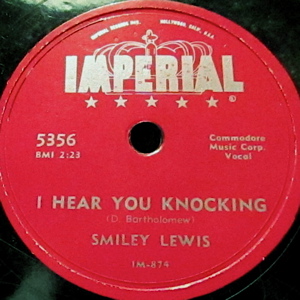
"I Hear You Knocking" is a rhythm and blues song written by Dave Bartholomew. New Orleans rhythm and blues singer Smiley Lewis first recorded the song in 1955. The lyrics tell of the return of a former lover who is rebuffed.
"The Fat Man" is a song by American rhythm and blues recording artist Fats Domino. It was written by Domino and Dave Bartholomew, and recorded on December 10, 1949. It is often cited as one of the first rock and roll records or at least a strong influence on the genre. This was a "rollicking" song, according to The Guardian "but what made it a rocker was Fats's barrelling piano triplets, combined with a solid big beat".
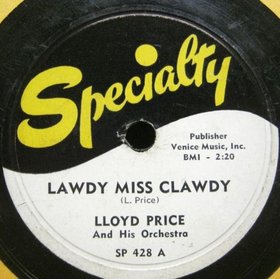
"Lawdy Miss Clawdy" is a song by New Orleans singer/songwriter Lloyd Price that "grandly introduced The New Orleans Sound". It was first recorded by Price in 1952 with Fats Domino and Dave Bartholomew during his first session for Art Rupe and Specialty Records. The song became one of the biggest selling R&B records of 1952 and crossed over to other audiences. "Lawdy Miss Clawdy" inspired many songs and has been recorded by a variety of artists.

Rock and Rollin' with Fats Domino is the 1956 debut album by rock and roll pianist and vocalist Fats Domino, compiling a number of his hits and other material, some of which would soon become hits. All included recordings have been released previously on Imperial Records singles from 1950 to 1956. The album, which featured a woodcut portrait of the musician, reached No. 17 on the Billboard "Pop Albums" chart. It is believed to have been produced by engineer Bunny Robyn due to the notation on the cover "A Robyn Recording".
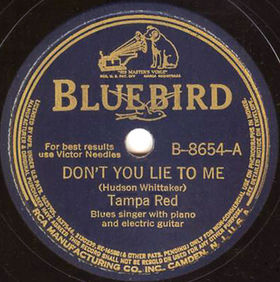
"Don't You Lie to Me" is a song recorded by Tampa Red in 1940. It became popular with blues artists, leading it to become a blues standard. The song was also interpreted by rock and roll pioneers Fats Domino and Chuck Berry.
Antoine "Fats" Domino Jr. was an American pianist and singer-songwriter. One of the pioneers of rock and roll music, More than 65 million records were sold by Domino. He had eleven Top 10 hits between 1955 and 1960. His humility and shyness may be one reason his contribution to the genre has been overlooked.
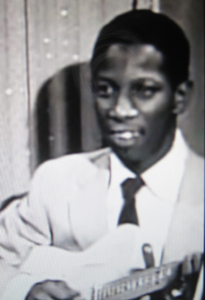
Walter Charles Nelson Jr., known as Walter "Papoose" Nelson, was an American R&B guitarist, best known for playing with Fats Domino, and on many of his hit records.
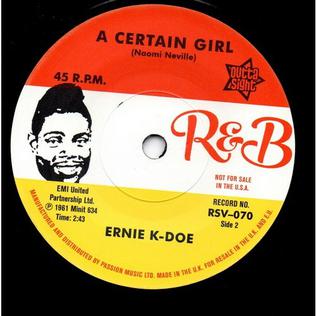
"A Certain Girl" is a rhythm and blues song written by Allen Toussaint, with the credit listed under his pen name Naomi Neville. New Orleans R&B singer Ernie K-Doe recorded it in 1961. Minit Records released the song as the B-side of "I Cried My Last Tear".
"Valley of Tears" is a song written by Fats Domino and Dave Bartholomew and performed by Fats Domino. In April 1957, it was released as single by Imperial Records and reached No. 2 on Billboard's R&B chart and No. 8 on its broader Hot 100. The single's B-side, "It's You I Love", reached No. 6 on the Hot 100 in 1957. Both songs are included on his 1957 album This is Fats.

Cornelius Jessie Coleman, also called "Tenoo", was an American R&B drummer best known for playing with Fats Domino's band and on many of his hit records.
"Goin' Home" is a song written by Fats Domino and Imperial Records producer Alvin Young. It was recorded by Domino in January 1952 and issued as a single by Imperial in March of that year. After debuting on April 26, 1952, the single reached No. 1 on the U.S. Billboard Best Selling Rhythm & Blues Records chart and became his first to top the record charts.
References
- 1 2 3 Hannusch, Jeff; Block, Adam (1991). Antoine "Fats" Domino: "They Call Me the Fat Man..." (Box set booklet). Fats Domino. Hollywood, California: Imperial Records/EMI USA. pp. 23, 45, 77. E2-96784.
- ↑ Whitburn, Joel (1988). "Fats Domino". Top R&B Singles 1942–1988. Menomonee Falls, Wisconsin: Record Research. p. 122. ISBN 0-89820-068-7.
- ↑ "Various artists - Music From the Film "A Rage in Harlem" (Sire 9-26617-2, May 1991)". musicbrainz.org. Retrieved 13 January 2020.
- ↑ "Fats Domino - "They Call Me The Fat Man...": The Legendary Imperial Recordings (4 CD, booklet) (EMI E2-7-96784-2, October 1991)". musicbrainz.org. Retrieved 13 January 2020.
- ↑ "Fats Domino - Out of New Orleans (8 CD, booklet) (DE, Bear Family BCD 15441 HI, November 1993)". musicbrainz.org. Retrieved 13 January 2020.